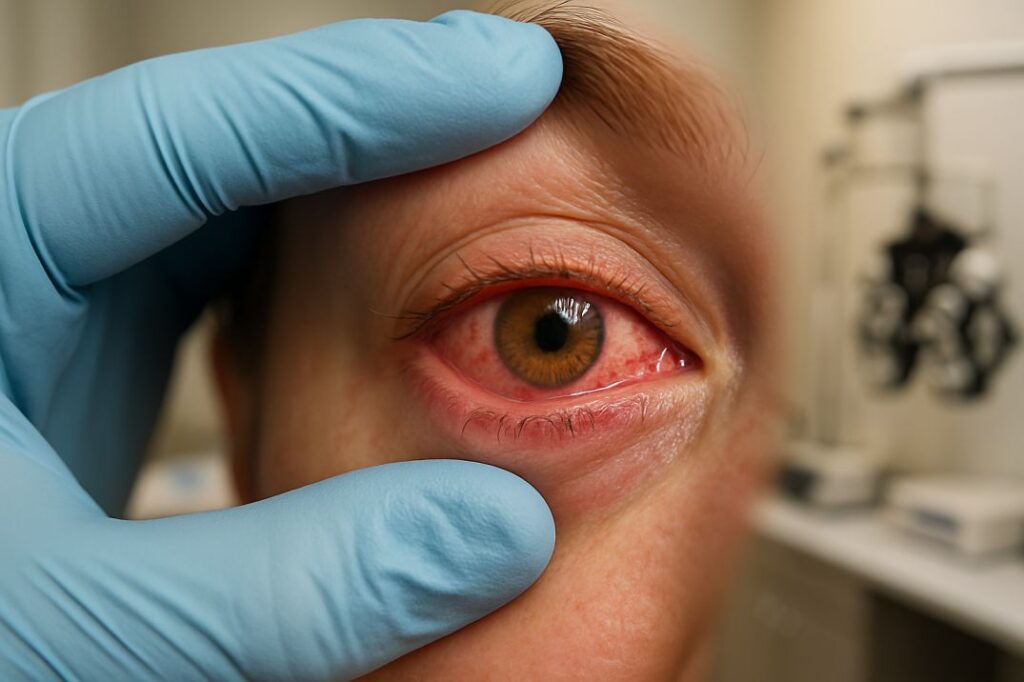Viral Eye Infections: Seattle Guide & Treatment
Key Takeaways: Viral Eye Infections in Seattle
-
Viral eye infections are highly contagious and often stem from adenoviruses or herpes simplex, spreading through airborne droplets or contaminated surfaces.
-
Symptoms typically begin in one eye and include redness, watery discharge, itching, and a gritty sensation, distinct from bacterial or allergic conjunctivitis.
-
Prompt diagnosis is essential—seek care at Cannon EyeCare if symptoms persist beyond 72 hours, worsen, or affect vision.
-
Prevention is powerful: Wash hands frequently, avoid sharing personal items, disinfect surfaces, and replace contact lens cases monthly.
-
At-home care focuses on relief, not antibiotics: Use artificial tears, cold compresses, and avoid contact lenses during infection.
-
Avoid unnecessary medications—antibiotic or steroid drops can worsen some viral conditions if used improperly.
-
Contagious for 7–10 days: Stay home, sanitize shared surfaces, and follow local school/work return policies.
-
Complications like corneal scarring or dry eye can occur, especially with herpes infections—complete treatment and attend follow-ups.
-
Cannon EyeCare offers advanced diagnosis and antiviral treatments, ensuring safe recovery and long-term eye health for Seattle patients.
What Are Viral Eye Infections?
Viral eye infections develop when viruses invade eye tissues, most often targeting the conjunctiva—the clear membrane covering the whites of your eyes and inner eyelids. Common types seen at Cannon EyeCare in Seattle, WA include:
-
Viral Conjunctivitis (Pink Eye): Typically caused by adenoviruses and is highly contagious.
-
Herpetic Eye Infections: Caused by herpes simplex virus, potentially affecting the sensitive cornea.
-
Other Viruses: Enteroviruses, varicella-zoster (shingles), and rarely, COVID-19.
How These Eye Viruses Spread in Seattle:
Transmission occurs through:
-
Airborne respiratory droplets
-
Contact with contaminated surfaces
-
Direct exposure to infected individuals
Your risk increases with poor hand hygiene, contact lens wear, or a compromised immune system.
Key Symptoms of Viral Eye Infections
Viral eye infections cause noticeable discomfort that can impact daily life. Seattle patients should watch for:
-
Redness and visible swelling
-
Watery or clear discharge (unlike bacterial infections’ thick yellow/green discharge)
-
Persistent itching or burning
-
A gritty sensation, like sand in your eye
-
Mild light sensitivity
-
Temporary blurred vision
-
Eyelid crusting or swelling (especially after sleep)
Symptoms typically begin in one eye and spread to the other.
Seek urgent care at Cannon EyeCare if you experience:
- Severe eye pain
- Sudden vision changes
- Thick, pus-like discharge
Viral vs. Bacterial vs. Allergic Eye Infections: Key Differences
Accurate identification ensures proper treatment. Here’s how to distinguish common eye infections:
-
Viral Conjunctivitis (Pink Eye):
-
Watery/clear discharge
-
Mild-moderate itching
-
Often follows colds
-
Highly contagious
-
-
Bacterial Conjunctivitis:
-
Thick yellow/green discharge (pus)
-
Eyelids may stick together
-
Mild itching
-
Highly contagious
-
-
Allergic Conjunctivitis:
-
Watery/stringy discharge
-
Severe itching
-
Usually affects both eyes
-
Not contagious (often with sneezing/nasal symptoms)
-
Stopping Viral Eye Infections: Spread & Prevention in Seattle
These infections spread easily through:
-
Direct Contact: Touching the eyes with contaminated hands
-
Shared Items: Towels, makeup, or contact lens cases
-
Airborne Particles: Coughs/sneezes in close quarters
Proactive Protection Strategies:
-
Wash hands 20+ seconds with soap (especially before touching eyes)
-
Never share eye cosmetics or personal items
-
Disinfect phones, doorknobs, and countertops weekly
-
Replace contact lens cases monthly
-
Stay home during active symptoms
Diagnosing Viral Eye Infections at Cannon EyeCare
Seattle eye doctors diagnose viral infections through:
-
Symptom Review: Recent illnesses, exposures, or travel
-
Comprehensive Eye Exam: Assessing redness, discharge, swelling, and corneal involvement
-
Advanced Testing: Corneal staining or lab swabs for complex cases
Seek Professional Care in Seattle If You Experience:
- Symptoms beyond 48-72 hours
- Sharp pain or vision changes
- Light sensitivity disrupts daily tasks
- Contact lens wear (higher complication risk)
Effective Viral Eye Infection Treatment Plans
While most viral infections clear in 1-3 weeks, these strategies ease recovery:
At-Home Relief:
-
Apply preservative-free artificial tears hourly
-
Use cold compresses (10 mins, 3x daily)
-
Stop contact lenses until symptoms fully resolve
-
Maintain hydration and rest
Avoid These in Seattle:
- Antibiotic drops (ineffective against viruses)
- Non-prescribed steroid drops (risk of corneal damage)
- Sharing towels/pillows during outbreaks
Medical Treatments We Provide:
-
Antiviral medications for herpes infections
-
Prescription anti-inflammatory drops
-
Discard & Replace:
→ Eye makeup after 2 weeks of infection
→ Contact lenses/cases immediately
Contagion Period & Prevention in Seattle
Viral eye infections remain contagious as long as redness or discharge persists, typically for 7–10 days. Protect others with these steps:
-
Isolate: Stay home from Seattle workplaces/schools until symptoms clear
-
Sanitize Daily: Disinfect phones, doorknobs, and eyewear
-
Avoid sharing: Pillows, towels, and eye cosmetics for 2+ weeks post-recovery
-
Verify Local Policies: Seattle schools/daycares often require symptom-free +24 hours
Long-Term Risks & Seattle-Specific Care
While most viral infections heal fully, complications require vigilance:
Potential Concerns:
-
Corneal Scarring: Herpes viruses may damage vision if untreated
-
Chronic Dry Eye: Inflammation disrupting tear production
-
Recurrence: Herpetic flare-ups during illness/stress
Reduce Your Risk:
- Seek prompt treatment at the first symptoms
- Complete all prescribed antiviral courses
- Attend follow-up exams at Cannon EyeCare
- Track vision changes post-infection
FAQs
-
Redness, watery discharge, itching, and mild swelling are typical symptoms. Vision may be slightly blurred, and eyes can feel gritty or irritated




